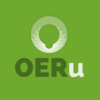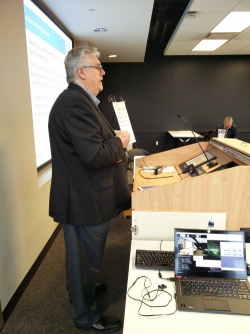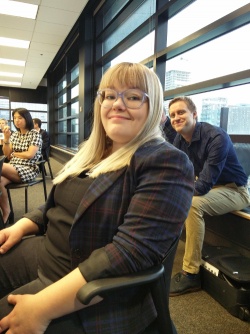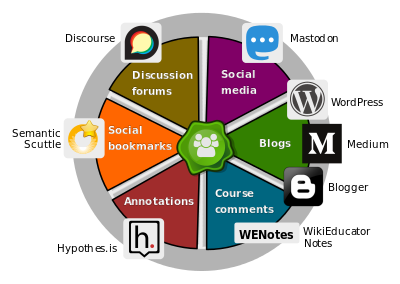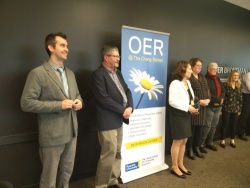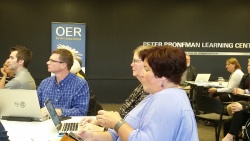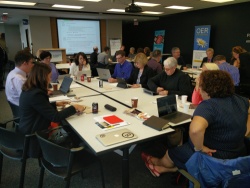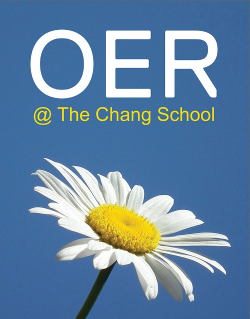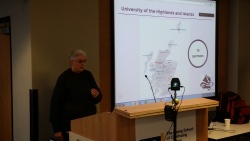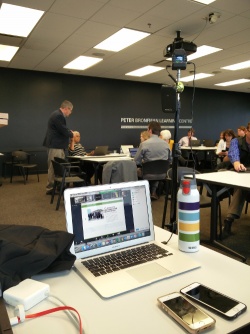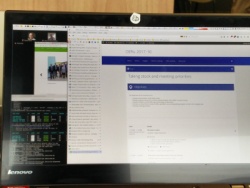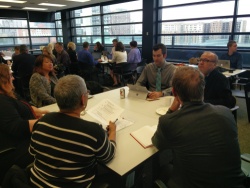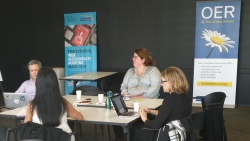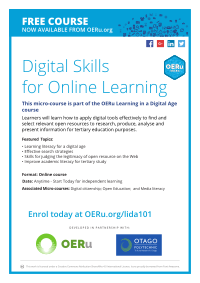OERu 17.10 partner's meeting report

The 6th meeting of OERu partners was hosted by eCampusOntario on 12 and 13 October 2017 at The Chang School of Continuing Education, Ryerson University in Toronto, Canada.
Contents
- 1 Summary of outputs and key decisions
- 2 Day 1: OERu past and present
- 3 Day 2: OERu strategic futures
- 3.1 Implementing the OERu 1st year of study
- 3.2 OERu process evaluation
- 3.3 Strategic OERu futures
- 4 Marketing group recommendations
- 5 Conclusion
Summary of outputs and key decisions
The summary of outputs and key decisions should be reviewed in conjunction with the detailed record of each component of the meeting agenda.
- Key priorities derived from the critical friend review, which helped to prioritise meeting discussions:
- Learner recruitment and marketing for the 1st year of study.
- Operationalising OERu credit transfer and articulation processes, recognising potential complexity and the time needed for inter-institutional work.
- Ongoing focus on OERu course quality to ensure consistency over time.
- Reflections on medium-term goals associated with the OERu programme of study, exit awards (including streams, themes and course clusters), and improving the vocational value of the OERu curriculum.
- Leveraging the strengths of partner institutions rather than all working individually on a standardised partner contribution to the network.
- Decision recommendations for improving OERu operations:
- Rationalise OERu organisational structures:
- Reduce the number of working groups to three, that is, Curriculum and Quality, Technology, and Marketing and Recruitment.
- Establish a Transnational Advisory Group (TAG) with membership of influential individuals with an interest in OER selected via partner invitation.
- Improve learner support and implement Academic Volunteers International (AVI):
- Work with P2PU Learning Circles to support selected OERu courses
- Scope what a pay for support or pay for tutoring service may look like, and how it could be viable
- Research what the OERu learner support services may need and what OERu can offer.
- Integrate the feedback from meeting into the work of the OERu quality review project.
- Rationalise OERu organisational structures:
- Decision recommendation for implementing the 1st year of study.
- Propose a phased launch schedule of the OERu MVP courses commencing with Learning in a Digital Age in February 2018 as the pilot course, followed by groupings of courses to be launched every 3 to 4 months for consideration by the Council of CEOs.
- Decision proposals for the process evaluation
- Incorporate suggestions from OERu 17-10 partners meeting into survey instruments and implement process evaluation during 2018.
- Remove CEO qualitative interviews from the draft process evaluation plan.
- Consultation on OERu Strategic Plan 2018 - 2020
- Draft and circulate OERu Strategic Plan 2018 - 2020 taking recommendations and major trends discussed at OERu 17-10 into account to achieve final approval by year end according to process to be determined by the Council of CEOs meeting.
- Marketing group recommendations:
- Adopt a new learner focused elevator pitch (Current draft: Change your life's course one course at a time. Begin your degree at higher learning institutions from all around the world. Start for free, start today.).
- Generate personas from OERu data that can be used to create the marketing brief
- Start a lead nurturing email campaign for the 1st year of study
- Timeline:
- Send initial email to existing leads 8 weeks prior to launch of first course
- Send reminder email 3 weeks before first course
- Ongoing evaluation of website analytics to assist in refining personas.
- Work on marketing content for learners on the oeru.org site. (Including graphics that tell people how to start learning, how to build a credential, how to use micro-credentials etc.
- Prepare press release(s) to announce the first year of study launch.
- Explore options to outsource assistance with the $10,000 per month Google adwords grant to an agency.
- Venue and dates of OERu 2018 meetings:
- 7th International Meeting of OERu Partners, Wednesday 7 and Thursday 8 November 2018, Charles Sturt University, Port Macquarie.
- 6th meeting of the OERu Council of Chief Executive Officers, Friday 9 November 2018, Charles Sturt University, Port Macquarie.
Day 1: OERu past and present
Setting the scene
David Porter, Chair and host of the meeting acknowledged the land on which the meeting took place and welcomed participants to Toronto.
Elaine Lam, Executive Director, Business Development and Strategic Planning, welcomed participants to the University on behalf of Dean Bountrogianni of the Chang School of Continuing Education, Ryerson University, who on account of a family emergency could not be present. The Chang School shared that joining OERu was a critical component of their commitment to the concept of open education and noted that OER creation and adoption has become a key priority for Ontario, with the province providing successive rounds of funding in support of OER production and reuse administered by eCampusOntario. (Copy of welcome address.)
Participants from Europe, North America and Oceania introduced themselves.
Meeting aims
David Porter summarised the aims of the meeting, namely to:
- Review progress with the implementation of the OERu Strategic Plan 2015 - 2017
- Plan the implementation of the OERu 1st year of study
- Refine the OERu process evaluation plan
- Consult on the development the OERu Strategic Plan 2018 - 2020
- Determine operational priorities for 2018.
OERu milestones
Wayne Mackintosh summarised milestones and key decisions of the OERu implementation:- Assessment and Credit for Students - Open Meeting (February 2011, Dunedin): Proposal of the OERu concept, planning framework and adoption of the CIPP (Context, Input Process and Product) evaluation model to inform implementation.
- Inaugural meeting of the OERu Founding Anchor Partners (November 2011, Dunedin): Agreed the inaugural credential (Bachelor of General Studies) and adopted a prototyping model to assemble a small number of courses to refine the OERu delivery model.
- 2nd Meeting of OERu partners (October 2013, Kamloops): Initiated the OERu working group organisational structure, and proposed a micro course structure with opportunities for gaining micro-credentials. Launch of the OERu officiated by Sir John Daniel.
- 1st Meeting of the OERu Council of Chief Executive Officers (Nov 2013, Kamloops): Agreed terms of reference for the Council; established the Executive Committee with representatives from Africa, Europe, Oceania and North America; and tasked the consultative development of the OERu strategic plan.
- 3rd Meeting of OERu partners (November 2014, Hobart): Approved the OERu Strategic Plan 2014 - 2017; tabled the first draft of the OERu guidelines for credit transfer; and reviewed the plan for the Input Evaluation.
- 2nd Meeting of the OERu Council of Chief Executive Officers (Nov 2013, Sydney): Endorsed the OERu Strategic Plan 2015 - 2017 and approved the implementation of OERu annual "Institutional Action Plans".
- Oceania and North American OERu Regional Meetings (August 2015 and September 2015, Toowoomba and Vancouver respectively): Consultation to design and develop the OERu open business model.
- 4th Meeting of OERu partners (October 2015, Vanderbijlpark): Unanimous approval of the OERu guidelines for credit transfer and credit accumulation, and decision to implement the OERu 1st year of study as a minimum viable product.
- 3rd Meeting of the OERu Council of Chief Executive Officers (October 2015, Vanderbijlpark): Endorsed proposal to implement the OERu 1st year of study and nominated the Certificate in Higher Education at the University of the Highlands and Islands as an exit credential. Expanded the Council's terms of reference to provide advice, guidance and support on implementing the OERu.
- 5th Meeting of OERu partners (October 2016, Inverness): Confirmed the launch of the OERu 1st year of study leading to two exit qualifications: Certificate of Higher Education in Business, University of the Highlands and Islands; and the Certificate of General Studies, Thompson Rivers University.
- 4th Meeting of the OERu Council of Chief Executive Officers (October 2016, Inverness): Endorsed the decision to launch the OERu 1st year of study leading to two exit qualifications, while pursuing realistic but conservative targets as the OERu model builds brand awareness and collects data from the process evaluation to inform future decision-making.
Taking stock and establishing meeting priorities
| Video recording of Session 2 | |||||||||||||||||||||||||||
|---|---|---|---|---|---|---|---|---|---|---|---|---|---|---|---|---|---|---|---|---|---|---|---|---|---|---|---|
  | |||||||||||||||||||||||||||
|
Progress report - OERu 1st year of study
OERu 1st year of study and MVP technology platform (slides).
Wayne Mackintosh summarised progress with the implementation of the OERu first year of study noting that the network has completed sufficient open online courses for the two OERu designated exit qualifications: Certificate of Higher Education in Business (CertHE) to be conferred by the University of the Highlands and Islands; and the Certificate of General Studies to be conferred by Thompson Rivers University.The OERu has partnered with Edubits, a micro-credentialing initiative led by Otago Polytechnic, which will provide assessment services and associated micro-credentialing opportunities for OERu micro-courses. The network will pilot Edubits for the optional business courses in the CertHE Business(OERu). Once learners successfully achieve the set of associated micro-credentials, they will qualify for transcript credit, which can be applied to the CertHE Business.
Wayne provided an overview of the OERu component-based delivery platform, which is an open source implementation of a next generation digital learning environment. He also demonstrated a few pedagogical features of an OERu online course, including the following examples: resource bank activity (Semantic Scuttle), annotation activity (Hypothes.is), and the course feed, which aggregates posts from a variety of open source interaction technologies (WENotes comments, blog posts, discussion forum posts, annotations, social bookmarks and social media posts).
OERu MVP Technology platform: What, why, and what's in it for you?
In his presentation, Dave Lane explained the "loosely coupled components" technology model that the OERu has adopted in order to build the OERu technology stack. This approach eschews the monolithic "learning management system" model to which many institutions are now committed. Instead, the OERu uses the Internet as its digital learning environment, by incorporating best-of-breed Free and Open Source (FOSS) components, integrated loosely, but with single-sign-on and consistent branding.Dave explained why the OERu has adopted this approach to protect the security, sovereignty, privacy, and digital artefacts of OERu learners. He also provided a description of some of the technologies chosen, and noted how OERu partners could benefit from adopting these technologies in their own institutional technology mix.
Critical friend review
Participants were assigned to three groups and tasked to: identify what the OERu has done well; identify areas where the OERu can improve; and identify the top priorities the meeting should address (Note: The consolidated feedback below has been assembled from the feedback recorded by Group 1, Group 2, and Group 3 respectively).
Summary of what the OERu is doing well
- OERu value proposition and culture:
- Maintaining the philanthropic underpinnings of the entire project
- Building a networked model, which enables the sharing of risk across partners
- Developing a sustainable, high value networked model for open education in the formal sector
- Promoting a culture of open sharing, which generates opportunities for staff at partner institutions to build authentic experience in open educational practices.
- OERu planning, organisation and operations:
- Demonstrating a consistent commitment to transparent planning and public documentation, which enables people to continue development where others have left off
- Developing a free and open source, component-based delivery platform, providing a coherent integrated product suite
- Pioneering an international system of credit transfer and course articulation based on open online courses
- Modelling rigorous planning with realistic goals (not moving too quickly)
- Maintaining a public record of our institutional history and summarising this at partners' meetings to account for changing roles over time.
- OERu meetings:
- Creating agendas cooperatively via open consultation
- Conducting annual international partners' meetings to promote accountability, responsibility and the development of realistic strategic action plans
- Encouraging engagement by inviting observers to participate in meetings thereby improving awareness of OERu.
Summary of where the OERu can improve
- Marketing and promotion:
- Increasing the distribution of slideshows / materials for partners to reuse in promoting OERu
- Striving to achieve a more representative global distribution of partners, which is presently "Western centric"
- Refining the pitch for prospective partners by making it obvious (3 bullets) how the OERu can generate revenue streams for members, noting that the community service and business goals of the OERu are not mutually exclusive.
- Organisation and operations:
- Expediting the implementation of the 1st year of study
- Improving the potential for reuse of OERu courses by including documentation on the design rationale (e.g. why it was set up the way it was, intended target audience, pedagogical rationale and activity strategy)
- Developing and implementing an OERu induction program, as a refresher for older partners and to support new members.
- OERu website:
- Explaining concisely the proposition for learners and the processes by which they can engage
- Disseminating clear messaging on the courses available for the 1st year of study and information on how learners can achieve the designated exit qualifications (see for example, the FutureLearn site with drop-down menu and the ability to put courses together to see what qualifications learners can achieve)
- Improving the ability to find relevant information (eg searchable mind map of course information).
Key meeting priorities
The breakout groups highlighted the following priorities for the meeting:
- Learner recruitment and marketing for the 1st year of study
- Operationalising the OERu credit transfer and articulation processes, recognising potential complexity and the time needed for inter-institutional work
- Ongoing focus on OERu course quality to ensure consistency over time
- Reflections on medium-term goals associated with the OERu programme of study, exit awards (including streams, themes and course clusters), and improving the vocational value of the OERu curriculum
- Leveraging the strengths of partner institutions, rather than all working individually on a standardised partner contribution to the network.
Improving OERu operations
| Video recording of Session 3 | |||||||||
|---|---|---|---|---|---|---|---|---|---|
  | |||||||||
|
Aligned with the priority to progress learner recruitment for the 1st year of study, Wayne proposed a dedicated marketing group to work on the development of a marketing brief for the duration of the meeting. The outputs of this group are reported separately below.
Nico Koenig summarised Peer 2 Peer University's (P2PU) Learning Circle program - an innovative collaboration with public libraries around the world which provide face-to-face learning support for free online courses. Wayne invited the OERu partners to consider how P2PU's Learning Circles could be integrated into OERu's Academic Volunteers International (AVI) initiative.
Adrian Stagg (University of Southern Queensland) briefed the meeting on the work he is coordinating for the OERu quality review working group. Adrian highlighted the importance of consistency across OERu courses as a component of quality of the learner experience. The aim of the OERu quality review group is to generate quality guidelines to improve consistency of the OERu learning experience based on remixing and adapting existing quality guidelines for online learning. These guidelines could be used as benchmarks for both design and review of OERu courses.
Redesigning OERu organisational structures
| Feedback - Session 3 Groups | ||||||||||||||||||
|---|---|---|---|---|---|---|---|---|---|---|---|---|---|---|---|---|---|---|
  | ||||||||||||||||||
|
David Bull (University of Southern Queensland) reported back on discussions and proposals for rationalising the OERu organisational structures. The group recommended that the OERu Council of CEOs and OERu Management Committee, comprising the conveners of the reconstituted working groups, should be maintained. The six existing working groups should be collapsed into three working groups as follows:
- Curriculum and Quality - combining the Curriculum, Program of Study, Quality, and Credit Transfer working groups.
- Technology - retaining and building from the existing Technology working group.
- Marketing and recruitment - incorporating student and partner recruitment.
The group proposed the establishment of an OERu Transnational Advisory Group (TAG) with membership determined by partner invitation. The proposal is to select influential individuals, who have a demonstrated interest in open education. The chair of TAG could be an elected member of the group.
Learner support and implementing Academic Volunteers International (AVI)
Matt Dyck (Thompson Rivers University) reported on the brainstorming ideas and proposals for action to improve learner support and implement AVI. Key proposals for action that emerged from group discussions:- Work with P2PU Learning Circles to support selected OERu courses
- Scope what a pay for support, or pay for tutoring service, may look like and how it could be viable
- Research what the OERu learner support services may need and what OERu can offer (E.g. generate a list of services students actually need, survey existing research on MOOCs and student experience, map out a rating system of what a 1-star experience versus a 10-star experience looks like, define targets.)
OERu quality review project
Adrian Stagg (University of Southern Queensland) summarised a wide ranging discussion on quality in OER. The discussions focused on the kind of learner experience the OERu would like to achieve to drive learning design and quality review. The group acknowledged the OERu challenges designing for an "unknown" target audience. Given the open nature of OERu courses, which do not require registration, it is difficult to implement a preferred learning sequence for a programme of study. The group noted that context is a key factor that should be taken into account when developing quality indicators. The key proposal is to integrate the feedback and discussion points into the work of the quality review project.
Ontario open education showcase
| Video recording of Session 4 | |||||||||||||||
|---|---|---|---|---|---|---|---|---|---|---|---|---|---|---|---|
  | |||||||||||||||
|
Presentation | OER module builder report
David Porter provided an update on the work of eCampusOntario highlighting the depth of their "Rethinking" strategy for higher education and online learning in the province of Ontario. Upskilling of faculty for technology-mediated and technology-enhanced learning is a guiding principle for eCampusOntario, which is underpinned by the attributes for 21st century educators. A key innovation is the adoption and support for faculty to use a "domain of one's own" for their professional portfolio, which will become the real portfolio for students in the future. The rethinking strategy focuses on:
- Rethinking learning resources (What happens when we bring teaching and learning into the open?)
- Rethinking the learning experience (Addressing the engagement factor in online learning; improving learning design to add authentic, relevant and real-world projects; and bringing students into the learning design process)
- Rethinking recognition of prior learning (Enabling and authenticating "can-do" skills and competencies).
eCampusOntario is following a strategy to build a "T-shaped" student, that is someone who has deep domain knowledge but a broad set of cross domain skills and attitudes to help them get employed, further their education and become better citizens.
David acknowledged the significant investment from government in OER in the province noting that the BCcampus open textbook library has been imported and now also operates in Ontario. Technology enabled solutions for experiential learning are a key component of Ontario's strategy. Government in Ontario is focused on providing on-demand learning opportunities, including ten open badging pilot projects to further the adoption of micro-credentialing in the province. OER is an important enabler for this strategy; for example, eCampusOntario would like to explore reuse of the OERu's series of microcourses from the Introduction to Project Management course to provide on-demand learning opportunities and associated microcredentials.
Issues4CEOs
Wayne reviewed the Issues4CEOs document noting the issues recorded during the first day of the meeting. Recognising that institutions are at different phases of the open education journey, Marc Singer proposed that the network should explore the possibility of OERu providing support and consulting services to partners.
Day 2: OERu strategic futures
Implementing the OERu 1st year of study
Session 5 was dedicated to planning the implementation of the OERu 1st year of study.| Video recording of Session 5 | |||||||||||||||||||||
|---|---|---|---|---|---|---|---|---|---|---|---|---|---|---|---|---|---|---|---|---|---|
  | |||||||||||||||||||||
|
Status report on the OERu exit qualifications
Andy Brown (University of the Highlands and Islands) confirmed the official approval of the CertHE Business (OERu), which is one of the first qualifications based entirely on OER to be approved in the United Kingdom. The approval process required meeting academic standards and quality criteria in line with the UK Quality Code for Higher Education mapped against the UK Quality Assurance Agency for Higher Education (QAA) subject benchmarks. This 1st year qualification, comprising 1,200 hours of learning (120 UK credits), will be awarded by the University of the Highlands and Islands (UHI). Learners will complete three compulsory UHI courses (60 UK credits). During the minimum viable product (MVP) launch phase, Otago Polytechnic and Thomas Edison State University will provide assessment services for the remaining 60 credits, which will be achieved through a credit transfer process based on transcripts issued by the assessing partners. Since 94 UK credits of OERu course materials are available for transfer credit, learners will have some choice. The partner institutions actively engaged in the MVP launch have worked collaboratively to develop the OERu Credit Transfer and Course Articulation Agreement, which has been approved by the respective Registrars.
Andy highlighted two significant outcomes from the approval process:
(i) Given the mission of OERu to widen access, the appropriate UHI committee approved the CertHE Business (OERu) without any prerequisite entrance requirements.
(ii) The development of the CertHE Business OERu Learner Handbook provides an exemplary support resource for learners.
Brenda Thomson confirmed that Thompson Rivers University (TRU) has assigned a team to finalise approvals for the Certificate of General Studies, noting that the OERu initiative has strong support and endorsement from executive leadership at the University. The Certificate of General Studies is comprised entirely of elective credits (30 Canadian credits) with a "residency" requirement of 6 credits that must be assessed locally by TRU. To meet the residency requirement, TRU has assembled two OERu courses (6 credits). The remainder of OERu courses could potentially qualify for transfer credit subject to local course approvals. At TRU, it is possible to establish "residency" through Prior Learning Assessment and Recognition (PLAR), but learners cannot establish a Grade Point Average (GPA) through PLAR. Typically, transfer credit is not assigned a GPA, but TRU is investigating mechanisms for recognising (GPA) that could be assigned to incoming transcripts. Learners are required to establish a 2.0 GPA at TRU. While this can be achieved via the locally assessed residency courses, TRU is in the process of reviewing course-for-course transfer, to identify OERu courses, which are similar to existing courses at TRU. Those OERu courses, which do not appear on the university calendar at TRU, may be considered for unassigned credit. By working towards reciprocal credit transfer with partner institutions wherever possible, TRU is aiming to achieve a seamless process for OERu learners. To assist in refining the necessary operational processes, Brenda recommended piloting one or two OERu courses.
Marc Singer advised of the initial approvals for a 1st Year Foundations Certificate, which is designed to satisfy general education requirements at Thomas Edison State University (TESU). The proposed certificate includes six OERu courses, two courses from the Saylor Academy, and two courses to be assembled by TESU. This 1st Year Foundations Certificate could well be incorporated as a designated OERu exit qualification.
OERu technology roadmap
Dave Lane updated the meeting on recent FOSS software deployments used to support the OERu via the integration of component technologies, including: Mastodon (social network), LimeSurvey (online survey software), Mautic (marketing automation) and WENotes updates (course feed aggregation and messaging system). Dave highlighted the fact that the OER Foundation publishes technical recipes for deploying the OERu open technologies. Should any of these technologies be adopted by partner institutions, significant savings could be accrued and institutional risks associated with vendor lock-in could be minimised. Dave proposed the following roadmap for OERu technology development:
- During MVP:
- Usability - develop a new Course (WordPress) theme focused on accessibility, adopting modern "adaptive layout" techniques to better support devices from mobile through desktop
- Community Source - engage actively on a regular basis, possibly for the equivalent of one day per month, with at least one technical person at each partner institution to provide professional development opportunities and to increase the depth of OERu technology support
- Improved Course Presentation and Search - improve the OERu website and enhance the way learners can search for (and request updates on) courses offered by the OERu and partner institutions
- Infrastructure - implement tools to monitor OER Foundation systems to help avoid potential bottle necks affecting OERu's ability to achieve "Internet Scale".
- Post MVP:
- Improve WENotes - deploy a new open messaging standard (Matrix), which would facilitate more robust integration of new services and would give the OERu the opportunity to consider new models for leveraging the community
- Open sourcing automated assessment - seek a FOSS option to incorporate learner-generated questions and answers in OERu courses, including the review of the Moodle "Student Quiz" plugin, and automated assessment delivery platforms such as TAO Testing.
OERu launch schedule group
| Feedback - Session 5 groups | |||||||||||||||||||||
|---|---|---|---|---|---|---|---|---|---|---|---|---|---|---|---|---|---|---|---|---|---|
  | |||||||||||||||||||||
|
This breakout group focused on achieving a schedule for a minimum viable product ensuring that a learner commencing study with the OERu is guaranteed a pathway towards an exit qualification.
With reference to the Certificate of General Studies, TRU will prioritise the approvals for a minimum of 10 courses (30 Canadian credits). The 3 courses contributed to OERu by partners in British Columbia will already qualify for approval through the BCCAT provincial transfer system, leaving just 7 courses to be approved. TRU will work closely with TESU, which already has 8 OERu courses that can be assessed for transcript credit. It is anticipated that the initial 10 course approvals could well be completed by mid 2018.
With reference to UHI's CertHE Business(OERu), Learning in a Digital Age will be launched in February 2018 as the first pilot; followed by a phased launch of the credit transfer courses to be assessed by Otago Polytechnic and TESU for the remainder of the year. UHI anticipates completion of the three core courses to be assessed at the University by January/February 2019. It was noted that a number of the business courses could also be approved for credit towards the Certificate of General Studies.
Technology group
The technology group spent time brainstorming around how to use the existing OERu technologies and identifying potential gaps in the current technology stack. To help promote potential wider adoption in the network, the group recommended developing rationales for justifying the selection of specific tools . It was also agreed that it would be valuable to develop a process for recommending how new FOSS tools can be added to the OERu stack. The OERu should consider inviting guest posts from partners for the oeru.org blog with reference to FOSS tools they have found particularly useful. Irwin DeVries noted that the EduCloud Server Service in British Columbia (which meets all provincial privacy requirements under the FIPPA legislation) could be worth exploring in the future. It was noted that the OERu does not currently establish a contractual relationship between learners and partner institutions until such time as a learner requests assessment services from a partner institution. When a learner does request assessment services from a partner, it is expected that the respective partner will administer registrations and related contractual obligations according to local legislation.
Due diligence group
The due diligence group generated a draft check list of the action items required for a successful launch of the OERu 1st year of study. Action items were grouped under the following headings:
- Check list for the individual course sites
- Check list for the OERu.org site
- Check list for assessing partner
- Check list for the conferring partner.
The group noted a number of cross-cutting items that appear under more than one heading;for example, instructions for assessment services and prices will need to be published on both the course site and the OERu.org site. The group stressed the importance of timely internal communications about the OERu processes and associated guiding principles, including potential issues such as industrial relations matters. Finally, the group recommended that post-MVP, the CEO's should discuss appropriate mechanisms related to comparable pricing of services within the network, with due recognition of the principle of institutional autonomy, which underpins the OERu model.
Discussion on decision proposals for the implementation of the OERu 1st year of study
Participants engaged in discussion on the decision proposal to take forward to the Council of CEO's meeting. A number of potential complexities and inter-dependencies were noted. For example, the marketing plan is dependent on meeting the dates and deadlines for the launch schedule, which can't be confirmed until courses have been approved by the receiving institution and credit transfer agreements have been signed by all the assessing institutions and respective conferring partner. So that learners have a guaranteed pathway to achieving an exit qualification, such matters need to be finalised prior to initiating the marketing campaign. During discussion the group:
- Agreed that working cooperatively to effectively manage "the time to launch" is critical for demonstrating the viability of the project and sustaining ongoing partner commitment
- Acknowledged the value of producing an overall OERu project plan for the launch of the 1st year of study, noting it would need to be flexible to accommodate local institutional capacity constraints and competing demands for resource time
- Considered whether the OERu should make a call to partner institutions for additional fiscal contributions to outsource tasks that must be completed in order to expedite the launch schedule
- Stressed the importance of getting a number of courses and learners participating because CEO's are expecting to see a tangible return (not necessarily cash flow) but in terms of learners engaging in the OERu model
- Acknowledged the potential benefits of implementing the wide range of suggestions and refinements arising from the meeting discussions; for example, developing learner support mechanisms and implementing a professional marketing strategy. However, it was noted that the network must be realistic, since OERu does not have the fiscal resources or capacity to implement all recommendations.
- Noted that the higher education landscape has changed considerably since OERu was first conceived with greater acceptance of OER adoption and a growing number of institutions offering free courses for credit, so that it is imperative that OERu launches its courses as soon as possible and continues to refine the model as the initiative gains momentum
- Noted the need to incorporate continuous feedback from learners as soon as the launch schedule is implemented.
Decision recommendation for the CEO's meeting
- Propose a phased launch schedule of the OERu MVP courses, commencing with Learning in a Digital Age in February 2018 as the pilot course, followed by groupings of courses to be launched every 3 to 4 months.
OERu process evaluation
At the OERu 2011.11 meeting of founding anchor partners, it was agreed that the project evaluation be guided by the Context, Input, Process and Product Evaluation (CIPP) model (see Stufflebeam 2007) with the aim of facilitating decision making and providing input into the structure of the OERu project framework as it evolved. The OERu is now planning the process evaluation which will focus on the implementation by monitoring project operations.Wayne Mackintosh summarised the process evaluation plan, which aims to collect quantitative and qualitative data from the three major stakeholder groups: OERu learners (n= 2000 - 6000); course developers (including learning design consultants, subject matter experts, n=+-32); and OERu partners. The OERu has prepared a new OERu participant survey (pdf version). All learners participating in the OERu 1st year of study will be invited to complete the survey. Meeting participants were invited to brainstorm survey items for inclusion in the process evaluation:
Clive Mulholland, Vice Chancellor of the University of the Highlands and Islands, advised that CEO interviews should not be required for the process evaluation.
Decision proposals
- Incorporate suggestions from OERu 17-10 partners' meeting into the survey instruments and implement the process evaluation during 2018
- Remove CEO qualitative interviews from the draft process evaluation plan.
Strategic OERu futures
| Session 7 and Conclusion | ||||||||||||||||||||||||
|---|---|---|---|---|---|---|---|---|---|---|---|---|---|---|---|---|---|---|---|---|---|---|---|---|
  | ||||||||||||||||||||||||
|
Wayne relayed recommendations from Emeritus Professor Jim Taylor, (OER Foundation Board member), which were submitted via the virtual participant document. Jim recommended that the OERu should prioritise the consolidation and evaluation of the 1st year of study prior to allocating resources to the 2nd and 3rd year of study. He suggested that the OERu should explore how it might achieve a leadership role in transnational micro-credentialing and the issuing of associated open badges. Other major initiatives that Jim recommended to be undertaken during the next planning cycle included: completing the process evaluation, thereby establishing the foundations for the analytics project and the product evaluation; reviewing and updating the open business model to include the potential deployment in mainstream operations of not only OERu courseware, but also OERu open source software infrastructure; and prioritising student support initiatives by trialling P2PU learning circles and refining and implementing Academic Volunteers International.
Group 1 discussed strategic objectives for the next planning cycle. The group suggested prioritising 1st and 2nd year courses for the next cycle, noting that 3rd and 4th year courses tend towards meeting discipline specific needs, making it more challenging to develop coherent pathways in the OERu transnational context. Based on existing courses and pathways, a 2-year associate degree exit qualification could be achievable. The group recommended developing a workflow involving learners converting courses from the Saylor Academy for delivery via the OERu platform as part of an OERu course; for example, a learning design and development course for OERu certification. The group also recommended the development of a course in online mentoring, incorporating a practical component where learners provide mentoring for live OERu courses. It was noted that the open philosophy of OERu provides unique research opportunities for postgraduate students at partner institutions, which should be encouraged. Ongoing research, incorporating regular feedback from learners and partner institutions, should continue to be a key component of the strategy.
Group 2 discussed major trends and major initiatives to consider for incorporation into the OERu strategic plan. Micro-credentialing was identified as a top priority. The group recommended that OERu develop a clear definition and focus for the adoption of micro-certification taking assessment implications into account. Promoting authentic assessment, and the incorporation of game-based learning and simulations were deemed important. The OERu should also consider incorporation of tutorial support via handheld apps citing AskAway (British Columbia) and AskON (Ontario) as examples where libraries provide real-time chat support for learners. In addition, the following trends were considered important for the OERu strategic plan: blockchain authentication (transfer credit, authentication); attributes of the 21st century educator / learner, "domain of one's own" and the power of leveraging student advocacy for lifelong learning.
Decision recommendation
- Draft and circulate the OERu Strategic Plan 2018 - 2020, taking recommendations and major trends discussed at OERu 17-10 into account, with the aim of achieving final approval by year end, according to the process to be determined by the Council of CEO's meeting.
Marketing group recommendations
A core marketing group was established for the duration of the meeting. The OERF acknowledges the commitment from Kwantlen Polytechnic University and Thompson Rivers University, who funded marketing professionals from their respective institutions to attend the meeting. The overall goal of the group was to commence work on the development of a marketing brief for the OERu.Session 1
Wayne Mackintosh joined the opening session to brief the marketing group on existing marketing collateral including: the Learner promotional video (see also USQ and OP branded versions), a learner rackcard and an example of a course poster. Openly licensed, these resources have been designed to facilitate partner branding. The OERu has implemented Mautic (open source marketing automation software) which will enable the OERF to inject marketing collateral from partner institutions offering assessment and other services into the individual course email campaigns used for automating email instructions for learners, who opt to receive these. Wayne recommended that the group adopts an incremental strategy, doing what we can with what we have, rather than producing an elaborate master plan.Discussion notes from session 1:
- With reference to the CertHE (OERu), a UK based qualification, the marketing plan should target English speaking Commonwealth countries.
- Potential target audiences: career advisory services and employment centers, mature adults looking to gain credentials (eg 1st degree), lifelong learners, professionals looking to develop new skills, students who can't secure a place at partner institutions, and those trialling higher education for the first time.
- Goal-pitch media outlets: "First year of university free!"
- Strategy: Initially target three countries.
- Deliverables: Publish landing page(s) for potential customers; develop a media pitch for each of the three target countries; release content via social media accounts and identify individuals, who can monitor the social media pages to answer questions during the campaign period.
- Original elevator pitch: Global sharing, affordable learning. Review the original documents that were created in order to develop the media pitch and landing page(s) for specific audiences.
Session 2
Session 2 focused on steps and actions needed prior to making recommendations on target audiences and associated key messages.
- Analyse existing data with the goal of developing personas. The audience personas should include information on how the process works and outcomes (e.g career possibilities). The outcomes should speak to first time learners as well as those interested in professional development.
- Consider how to segment the website information; for example, by differentiating messages aimed at course takers and credential seekers.
- Provide information on microcredentials.
- Aim to make information visual where possible, by using infographics, videos, flow charts etc.
- Start collecting success stories and testimonials.
Session 3
During session 3 the group discussed proposals for a new learner-focused elevator pitch. The current draft is:
- Change your life's course, one course at a time. Begin your degree at higher learning institutions from all around the world. Start for free, start today.
Session 4
The final session was allocated to preparing decision proposals, which led to the following recommendations:
- Adopt a new learner-focused elevator pitch (see draft above)
- Use OERu data to generate personas that will help inform the creation of the marketing brief
- Start a lead-nurturing email campaign for the 1st year of study
- Timeline:
- Send initial emails to existing leads 8 weeks prior to the launch of the first course
- Send reminder emails 3 weeks prior to the launch of the first course
- Conduct ongoing evaluation of website analytics to assist in refining personas
- Work on marketing content for learners on the oeru.org site, including graphics that tell people how to start learning, how to build a credential, how to use micro-credentials etc.
- Prepare press release(s) to announce the first year of study launch
- Explore options to outsource (to an agency) assistance with the $10,000 per month Google "adwords" grant.
Conclusion
Wayne advised that the OERu will be consolidating and shifting its communications to more modern platforms:
- Participants were invited to create an account on the chat.oeru.org messaging platform (powered by Rocket.Chat, an open source alternative to Slack)
- Participants will receive email invitations to join community.oeru.org (powered by Discourse, a modern, open source forum and community platform.). Please advise the OERF if you do not wish to receive an invitation to join this site.
2018 meetings
Valerie Peachey, Professor and Strategic Advisor, Open Learning, announced that Charles Sturt University will host the 2018 OERu meetings at its Port Macquarie campus. Port Macquarie is a popular seaside location in New South Wales, about one hour's flight from Sydney. The OERu 2018 meeting dates are confirmed as follows:
- 7th International Meeting of OERu Partners, Wednesday 7 and Thursday 8 November 2018, Port Macquarie
- 6th meeting of the OERu Council of Chief Executive Officers, Friday 9 November 2018, Port Macquarie.
David Porter thanked the Chang School of Continuing Education for providing the meeting venue at Ryerson University in the Toronto downtown core. He noted that it had been a privilege for eCampusOntario to host the 6th International Meeting of OERu partners.
Footnote
- ↑ Left to right: David Porter (CEO, eCampusOntario), Nick Baker (Director, Office of Open Learning, Windsor University), Adrian Stagg (Manager, Open Educational Practice, University of Southern Queensland), James Glapa Grossklag (Dean, Educational Technology, Learning Resources, and Distance Learning, College of the Canyons), Matt Dyck (Associate Director, Program Delivery, Thompson Rivers University), Valerie Peachey (Professor - Strategic Advisor Open Learning, Charles Sturt University), Dave Lane (Open Source Technologist, OER Foundation), Wayne Mackintosh (Director, OER Foundation), Gail Morong (Senior Instructional Designer, Thompson Rivers University), Naza Djafarova (Director of Digital Education Strategies, Ryerson University), Lindsey Norris (Manager of Communications and Social Media, Thompson Rivers University), Irwin DeVries (Interim Associate Vice President, Open Learning, Thompson Rivers University), Joanne Saunders (Executive Director, marketing and recruitment, Kwantlen Polytechnic University), Leonora Zefi (Manager, eLearning Initiatives and Course Development, Ryerson University), Brenda Thomson (Associate Dean, Thompson Rivers University), Claire Goode (Senior Online Learning Designer, Otago Polytechnic), Theresa Steger (Director Digital Curriculum, Centre for Teaching and Learning, Humber College), David Bull (Director, Open Access College, University of Southern Queensland), Andy Brown (Head of Academic Development, University of the Highlands and Islands), Stephanie Chu (Vice Provost Teaching, Learning Scholarship, Kwantlen Polytechnic University), Valerie Lopes (Professor, Seneca), Marc Singer (Vice Provost, Thomas Edison State University), Sean Connor (Director of Community Relationships, Saylor Academy), Nico Koenig (Community Lead, Peer 2 Peer University (P2PU)), Eileen De Courcy (Associate Vice President, Teaching & Learning, Humber College), Clive Mulholland (Vice Chancellor and Principal, University of the Highlands and Islands), and Rory McGreal (UNESCO/COL/ICDE Chair in OER, Athabasca University).
